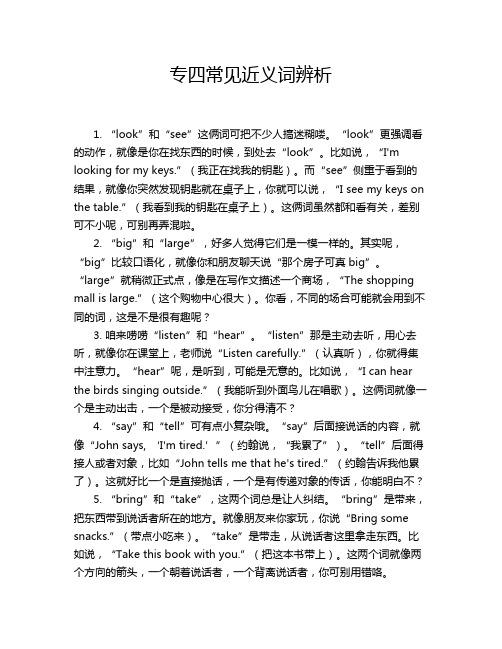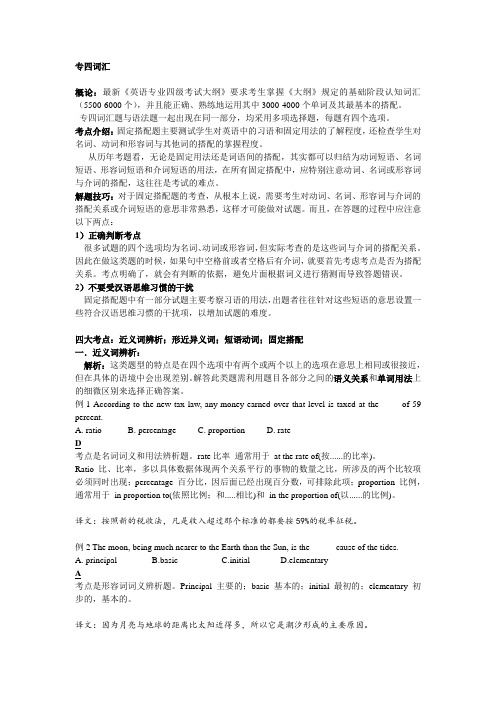专四近义词
专四近义词

arouse, rouse这组词均含有“唤醒,引起”的意思,两者往往可以通用。
rouse一般作及物动词,有时也可用作不及物动词。
arouse只作及物动词:The fire roused the people from their sleep.大火把人们从睡梦中惊醒。
We must arouse them to fight for their own emancipation.我们必须唤醒他们起来为自己的解放而斗争。
shake, tremble, quake, shiver, quaver这组词均含有“打破”或“挤碎”的意思。
shake适用范围广,可用于人也可用于物。
该词所表示的动作的方向既可以是水平的也可以是垂直的。
tremble专门用于表示人体轻微、迅速地振动,特别是当人激动、怯懦、寒冷、疲惫时不自觉地发抖。
quake可用来代替tremble,常表示剧裂震动,如地震等,也可表示人因天气寒冷发抖或因愤怒等强烈情绪而内心震动。
shiver意为“颤抖,哆嗦”,特指因寒冷或恐惧而打寒战,多用于人。
quaver有时表示不规则的震动或波动,尤其表示某些具有扰乱结果的震动或波动,它常常强调颤抖,特别是激动的情感对声音与言辞的影响。
To be shaken before taking.(药瓶标签用语)服前摇匀。
Her hands trembled with eagerness as she opened the letter.她拆信时,急得双手发抖。
His accusing hand stiffly extended, quaking in mute condemnation.他那控诉的手僵硬地伸出去,在无声的谴责中颤抖。
She is shivering with cold so that her teeth are chattering.她冷得直哆嗦,牙齿咯咯作响。
The breeze set the flames of the street lamps quavering.街灯在微风中摇曳着。
2022年专四常用近义词辨析

fast, hasty, quick, rapid, speedy, swift这组词均具有“迅速”,“快捷”意思。
fast强调速度快,且保持不变;又指钟表时间超过精确时间。
We took a fast train to Beijing.我们坐快车来北京。
hasty指匆忙、急促,涉及因而而引起慌乱、疏漏。
Don't arrive at hasty conclusions.quick强调动作、行为发生得突然且持续时间短。
指人时,暗示聪颖、领悟快。
The tiger took a quick leap at the sheep.rapid指就整个过程来讲速度快,但并不一定指这一过程速度始终均匀不变。
The growth of the economy has been rapid in recent years.speedy指人解决问题迅速或物体运转速度快。
His accusations brought a speedy denial.swift与fast和quick同义,但带有文学色彩。
Eagles are swift in flight.bother, disturb, trouble, worry这组词均具有“不断地烦扰她人或搞得某人心神不宁”意思。
bother和disturb惯用于积极和被动两种形式中。
用于被动时,bother指常受届时有时无小事烦扰。
用于积极时,bother意思比disturb强,带有故意打扰她人意思。
If you return me the book, I will stop bothering you.你归还我书后,我就不打扰你了。
disturb用于被动形式时,意思比bother强烈,有时甚至可指精神错乱。
用在积极形式时,意思最弱,指某人无意中打扰她人,这种打扰行为并非存心冲着她人去。
The man was mentally disturbed.这个人精神错乱了。
专四常见近义词辨析

专四常见近义词辨析1. “look”和“see”这俩词可把不少人搞迷糊喽。
“look”更强调看的动作,就像是你在找东西的时候,到处去“look”。
比如说,“I'm looking for my keys.”(我正在找我的钥匙)。
而“see”侧重于看到的结果,就像你突然发现钥匙就在桌子上,你就可以说,“I see my keys on the table.”(我看到我的钥匙在桌子上)。
这俩词虽然都和看有关,差别可不小呢,可别再弄混啦。
2. “big”和“large”,好多人觉得它们是一模一样的。
其实呢,“big”比较口语化,就像你和朋友聊天说“那个房子可真big”。
“large”就稍微正式点,像是在写作文描述一个商场,“The shopping mall is large.”(这个购物中心很大)。
你看,不同的场合可能就会用到不同的词,这是不是很有趣呢?3. 咱来唠唠“listen”和“hear”。
“listen”那是主动去听,用心去听,就像你在课堂上,老师说“Listen carefully.”(认真听),你就得集中注意力。
“hear”呢,是听到,可能是无意的。
比如说,“I can hear the b irds singing outside.”(我能听到外面鸟儿在唱歌)。
这俩词就像一个是主动出击,一个是被动接受,你分得清不?4. “say”和“tell”可有点小复杂哦。
“say”后面接说话的内容,就像“John says, ‘I'm tired.’”(约翰说,“我累了”)。
“tell”后面得接人或者对象,比如“John tells me that he's tired.”(约翰告诉我他累了)。
这就好比一个是直接抛话,一个是有传递对象的传话,你能明白不?5. “bring”和“take”,这两个词总是让人纠结。
“bring”是带来,把东西带到说话者所在的地方。
就像朋友来你家玩,你说“Bring some snacks.”(带点小吃来)。
专四常考近义词辨析

管理control, direct, govern, manage, rule, supervise, administer 这些动词均有“打点、支配”之意。
control :普遍的常用词,指对人或物施以约束或节制的力量。
A captain controls his ship and its crew.(船主打点他的船和船上的船员。
)direct :着重行使率领或指导权。
The general manager directed the company through a difficult time.(总司理率领公司渡过了难关。
)govern :着重指运用任何节制的权力来统治或打点一个国家、一个社会或一个部门,暗含能力和常识的运用。
A king governs in that country.(那个国家由国王统治。
)manage :强调对具体事务机构进行打点,有时含受权打点或措置之意。
She managed a clothes shop two years ago.(两年前她开了一家服装店。
)rule : 强调挪用绝对或专制的权力来打点或统治。
The King ruled his people well and wisely.(这位国王英明地统治着他的臣民。
)supervise :着重指运用自己的或被授予的权力来打点、监督工作,含看管意味。
Tomorrow he will supervise all the pupils taking the Englishexamination.(明天全体学生考英语, 他将担任监考。
)administer : 指官方的或正式的对事务的打点。
They had the right to administer their own internal affairs.(他们有权摒挡自己的事务。
)协商consult, negotiate, confer这些动词均含“协商、筹议”之意。
TEM4 近义词辨析;形近异义词;短语动词;固定搭配经典题目及答案分析

专四词汇概论:最新《英语专业四级考试大纲》要求考生掌握《大纲》规定的基础阶段认知词汇(5500-6000个),并且能正确、熟练地运用其中3000-4000个单词及其最基本的搭配。
专四词汇题与语法题一起出现在同一部分,均采用多项选择题,每题有四个选项。
考点介绍:固定搭配题主要测试学生对英语中的习语和固定用法的了解程度,还检查学生对名词、动词和形容词与其他词的搭配的掌握程度。
从历年考题看,无论是固定用法还是词语间的搭配,其实都可以归结为动词短语、名词短语、形容词短语和介词短语的用法,在所有固定搭配中,应特别注意动词、名词或形容词与介词的搭配,这往往是考试的难点。
解题技巧:对于固定搭配题的考查,从根本上说,需要考生对动词、名词、形容词与介词的搭配关系或介词短语的意思非常熟悉,这样才可能做对试题。
而且,在答题的过程中应注意以下两点:1)正确判断考点很多试题的四个选项均为名词、动词或形容词,但实际考查的是这些词与介词的搭配关系。
因此在做这类题的时候,如果句中空格前或者空格后有介词,就要首先考虑考点是否为搭配关系。
考点明确了,就会有判断的依据,避免片面根据词义进行猜测而导致答题错误。
2)不要受汉语思维习惯的干扰固定搭配题中有一部分试题主要考察习语的用法,出题者往往针对这些短语的意思设置一些符合汉语思维习惯的干扰项,以增加试题的难度。
四大考点:近义词辨析;形近异义词;短语动词;固定搭配一.近义词辨析:解析:这类题型的特点是在四个选项中有两个或两个以上的选项在意思上相同或很接近,但在具体的语境中会出现差别。
解答此类题需利用题目各部分之间的语义关系和单词用法上的细微区别来选择正确答案。
例1 According to the new tax law, any money earned over that level is taxed at the ____ of 59 percent.A. ratioB. percentageC. proportionD. rateD考点是名词词义和用法辨析题。
英语专业四级写作常见36类同义词归纳总结

1解决:Solve, deal with, cope with, handle, resolve, address, tackle2损害:Damage, hurt, injure, harm, impair, undermine, jeopardize3给与:Give, offer, render, impart, provide,supply, afford4培养::Develop, cultivate, foster5优势:Advantage, merit, virtue, benefit, upside, strength6缺陷:Disadvantage, demerit, drawback, downside, weakness7使迷惑:Puzzle, bewilder, perplex, baffle8重要的:Key, crucial, critical, important, significant, vital, substantial, indispensable, i mperative9认为:Think, believe, insist, maintain, assert, conclude, deem, hold, argue, be convin ced, be firmly convinced, be fully convinced10保护:Protect, conserve, preserve11确保:Assure, ensure, guarantee, pledge12有害的:Bad, baneful evil, harmful, detrimental13要求:Request, demand, needs, requisition14消除:Eliminate, clear, remove, clear up, take away, smooth away15导致:Lead to, bring about, result in, cause, spark off, conduce to, procure, induce, generate16因此:So, therefore, thus, hence, consequently, as a consequence, accordingly, as a result, because of this, as a result of this17增长至:Grow to,rise to,increase to,go up to,climb to,ascend to,jump to,shoot to18降低至:Dip to,fall to,decline to,decrease to,drop to,go down to,reduce to,slump to,descend to,sink to,slide to19保持稳定:Level out,do not change,remain stable,remain still,remain steady,be stable,maintain the same level,remain unchanged,be still,remain the same level,st ay constant,keep at the same level,level off,stabilize,keep its stability,even out 20急剧地:Dramatically,drastically,sharply,hugely,enormously,steeply,substanti ally,considerably,significantly,markedly,surprisingly,strikingly,radically,remarkably,vastly,noticeably21平稳地:Steadily,smoothly,slightly,slowly,marginally,gradually,moderately,mildly22宣称:Allege, assert, declare, claim23发生:Happen, occur, take place24原因:Reason, factor, cause25发展:Development, advance, progress26有益的:Useful, helpful, beneficial, profitable, rewarding,advantageous27影响:Influence, impact, effect28明显的:Clear, obvious, evident, self-evident, manifest, apparent, crystal-clear29占:Comprise, take up, account for, constitute, consist of, make up, occupy, hold, compose30与…相比:Compared with,compared to,in comparison with,in comparison to,b y comparison with,by comparison to31对比而言:By contrast,in contrast,on the other hand,on the contrary=,convers ely32展示:Show, reveal, illustrate, demonstrate, depict, present, represent, describe33大约:Approximately,almost,about,around,nearly,roughly34波动:Fluctuate,go ups and downs,display a fluctuation,demonstrate a fluctuati on35事实上:Practically,in practice,essentially,in essence,in reality,in effect,in f act,as a matter of fact,it is a fact that36换言之:Namely,that is to say,in other words,to put it like this,to put it diff erently,to put it from another way,to put it from another angle。
英语专四近义词词汇辨析

英语专四近义词词汇辨析英语专四近义词词汇辨析专四词汇辨析是考试的重点之一,考生要对这些易混词汇作比较详细的了解。
下面,小编为大家送上一些英语专四近义词词汇辨析,希望对大家有所帮助。
tired, exhausted, fatigued, weary, worn out这组词均含有"疲惫的";的意思。
tired可指因体力或脑力消耗太多而需要休息,还可指因长期做某事而失去兴趣。
?Henry was so tired that he went to bed immediately after he gothome.亨利很疲惫,一到家就上床睡觉去了。
exhausted表达的疲惫程度最强,指因劳累过度而精疲力竭The exhausted engineer fell asleep on the bus.精疲力竭的工程师在公共汽车上睡着了。
fatigued所表达的疲劳程度比tired和weary强,表示由于过度劳累而引起疲乏,不能再继续下去。
He felt fatigued and didn’t want to say a single word.他疲惫不堪,不想说一句话。
weary语气比tired强,指由于长时间努力工作或由于做单一的事而引起疲倦。
After a long and weary wait, the plane finally came to take them back.经过漫长而又令人疲乏的等待后,飞机终于来接他们回去了。
worn out这个词不太正式,多用于口语。
The troops were worn out after winning the battle.战后,部队疲惫不堪。
use, apply, avail, employ, utilize这组词均含有"使用";或"利用";之意。
use强调利用人或物作为工具。
专四同义词辨析

专四同义词辨析1.incident:突发性或相对而言不那么重要的事情。
event:重大事件或指体育比赛中的项目。
occurrence:计划,打算之外发生的事情occasion:时机,场合2.transform:改革,变革transport:运输transfer:传递,传送 transmit:发送(无线电)3.attack:发作(通常指疾病的发作)burst:爆发blast:爆炸4.campaign:运动(常用来表示政治性或商业性的活动或运动)5. roar:怒吼,轰鸣,咆哮scream:尖叫声whistle:耳语,私语exclamation:惊叫,欢呼声6.establishment:企业,设施(公司,学校,医院,教会)settlement:定居地,殖民地construction:建造,建筑物structure:构造,构造7.income:收入(泛指)wage:(体力劳动者)工资(按周领)salary:(白领人员)薪水(按月发)allowance:津贴,补助8.admission:常用于公共场所admittance:用于私人场所9.accurate:正确无误的,准确的(如天气预报,手表计算,射击)precise:准确的,明确的,细致的(如定义,细节,尺寸)exact:确切的,精确的(时间,数量,质量)10.variable:多变的,易变的(如雨量,气温)variation:变化,变更(数量,水平)variety:(同一事物的)不同种类,多种多样,多样化11.resident:居民,住户,(旅馆的)房客lodger:借宿者,寄宿者inhabitant:(某地的)居民settler:移民者,殖民者12.economical:节约的,节省的economic:经济上的,经济学的economy:经济economics:经济学13.waxy:蜡制的,似蜡的sticky:粘(性)的,棘手的,粘满果酱的greasy:①多油的,沾油脂的greasy fingers沾满油脂的手指②油腻的greasy chips油腻的炸薯条③油性的(头发或皮肤)long greasy hair 油性长发④(人或其行为)圆滑的,虚情假意的 a greasy smile假惺惺的笑容14.submissive:服从的,听话的dismissive:轻蔑的,鄙视的15.a patch of 一块••• a bunch of 一串,•, a packet of 一包,•, a pinch of 一撮•••16. spill:溅出,泼出 spoil:糟蹋,损坏 split:裂开,劈开17.关于•••,至于•••的表达 in regard to with regard to as regards as toin reference to with reference to18.strip①脱光,除去,剥去②(纸,金属,织物)条,带Cut the meat into strips 把肉切成条19.supply:向某人提供某物©supply sb with sth ②supply sth to sbprovide:向某人提供某物©provide sb with sth②provide sth for sb offer:向某人提供某物©offer sb . sth②offer sth to sb20 .minimal :最小的,最小限度的,极小的。
- 1、下载文档前请自行甄别文档内容的完整性,平台不提供额外的编辑、内容补充、找答案等附加服务。
- 2、"仅部分预览"的文档,不可在线预览部分如存在完整性等问题,可反馈申请退款(可完整预览的文档不适用该条件!)。
- 3、如文档侵犯您的权益,请联系客服反馈,我们会尽快为您处理(人工客服工作时间:9:00-18:30)。
grant /ɡrɑːnt/ CET4 TEM4 (granting,granted,grants) 1.N-COUNT A grant is an amount of money that a government or other institution gives to an individual or to an organization for a particular purpose such as education or home improvements. 补助金 例: They'd got a special grant to encourage research. 他们已得到了一笔用来支持研究的特别补助金。 2.V-T If someone in authority grants you something, or if something is granted to you, you are allowed to have it. 准予 例: France has agreed to grant him political asylum. 法国已经同意给予他政治庇护。 Single parents tend to grant more independence to their children than other parents do. 单亲父母往往比其他父母给予孩子们更多的自主性。 3.V-T If you grant that something is true, you accept that it is true, even though your opinion about it does not change. 承认 例: The magistrates granted that the charity was justified in bringing the action. 这些地方法官承认该慈善机构提起诉讼是有正当理由的。 4.PHRASE If you say that someone takes you for granted, you are complaining that they benefit from your help, efforts, or presence without showing that they are grateful. 对某人无感激之心 例: What right has the family to take me for granted, Martin? 这一家子有什么资格认为我所做的一切都是应该的,马丁? 5.PHRASE If you take something for granted, you believe that it is true or accept it as normal without thinking about it. 视某事为理所当然 例: I was amazed that virtually all the things I took for granted up north just didn't happen in Savannah. 令我感到惊讶的是,我在北方视为理所当然的一切事物,在南美大草原上几乎都没有发生。 6.PHRASE If you take it for granted that something is the case, you believe that it is true or you accept it as normal without thinking about it. 理所当然地认为 例: He seemed to take it for granted that he should speak as a representative. 他似乎理所当然地认为他应当作为代表发言。 词组短语 同近义词 同根词 take for granted认为„理所当然 government grant政府批地书,政府补助金 land grant政府赠地;政府拨给大学或铁路之土地 更多词组短语
entitle /ɪnˈtaɪtəl/ CET4 TEM4 (entitling,entitled,entitles) 1.V-T If you are entitled to something, you have the right to have it or do it. 使有权
例: If the warranty is limited, the terms may entitle you to a replacement or refund. 如果保修单有限制,这些条款可让你有权换货或退款。 They are entitled to first class travel. 他们有权享受头等舱旅行。 2.V-T If the title of something such as a book, film, or painting is, for example, "Sunrise,"
you can say that it is entitled "Sunrise." 给 (书、电影、画作等) 命名
例: ...a performance entitled "United States." …一场名为“合众国”的演出。 entitle 报错
英 [ɪn'taɪt(ə)l; en-] 美 [ɪn'taɪtl] 口语练习 跟读
vt. 称做…;定名为…;给…称号;使…有权利 [ 过去式 entitled 过去分词 entitled 现在分词 entitling ] 网络释义 英英释义
授权 权利 使有资格 取名 短语 entitle to 赋予…做 ; 给……权利 ; 授权 ; 正在翻译 entitle- 给 entitle title 授权是给个题目
massive /ˈmæsɪv/ CET4 TEM4 1.ADJ Something that is massive is very large in size, quantity, or extent. (尺寸、数量、
规模) 非常大的强调 例: There was evidence of massive fraud. 有证据表明是巨额欺诈。 ...massive air attacks. …大规模的空袭。 2.ADV 非常大地 massively 例: ...a massively popular game. …一种非常受欢迎的游戏。 3.ADJ If you describe a medical condition as massive, you mean that it is extremely
serious. 严重的
例: He died six weeks later of a massive heart attack. 他6周后死于一次严重的心脏病发作。 quantitative /ˈkwɒntɪtətɪv/ CET6 TEM4
1.ADJ Quantitative means relating to different sizes or amounts of things. 数量的; 与数有关的 例: ...the advantages of quantitative and qualitative research. „定量和定性研究的优点。 词组短语 同近义词 同根词 quantitative analysis[化]定量分析 quantitative method定量法;量化方法;计量方法 quantitative research量化研究
1 http://club.topsage.com/forum-28-1.html
专四近义词辨析 (精心整理版,有红色单词详细解释)
2013年英语专四专八全攻略名师指导视频课程模拟测试历年真题复习计划
2 http://club.topsage.com/forum-28-1.html
abide, adhere, conform, comply 这四个研究生入学考试中的高频考词都有“遵守”的意思,但是它们的搭配不同。 abide v.后接by表示“遵守,同意”。 I will abide by the director' decision.我将遵从主任的决定。 adhere v.后接to表示“遵守”。(当然adhere一词的其它意思如“坚持;粘附”也经常被考到。) Car drivers must adhere to the rules of driving.汽车司机必须遵守驾驶规则。 conform v.后接to表示“遵守,符合”。 All individuals are required to conform to the laws made by their governments.每个人都应该遵守政府制订的法律。 comply v.后接with表示“遵守,服从”,用于正式的场合。 Our company complies with governmental regulations on paying taxes.我们公司遵守政府有关纳税的规定。 abnormal, uncommon, disordered 这三个单词都有“反常的”之意,在考研和CET-6当中经常让考生们辨析它们的细微差别。
3 http://club.topsage.com/forum-28-1.html
abnormal a.不正常的,反常的(但并非罕见),指行为或现象(如气候)的异常。 His body temperature has been abnormal for 3 days, the highest point reaching 40.5 degree centigrade.他的体温三天来一直都不正常,最高的时候达到40.5摄氏度。(尽管身体发烧不正常,但生活中也时有发生。) uncommon a.罕见的,不平常的,指很少经历或很少见到的状况;特别的,出色的。 Hurricanes are uncommon in England.飓风在英国非常罕见。 That is uncommaon instant coffee; it tastes great!那速溶咖啡质量上乘,味道好极了! disordered a.混乱的,杂乱的;(精神或身体)有病的。 We couldn't understand her disordered presentation.我们听不明白她条理不清的陈述。 abolish, cancel, eliminate, dispose, erase, exclude, extinguish 这一组动词都有“取消,除掉”的意思。 abolish v.指对法律、习俗、制度的废除;完全破坏。 The government abolished the tax on alcohol.政府取消了酒税。
